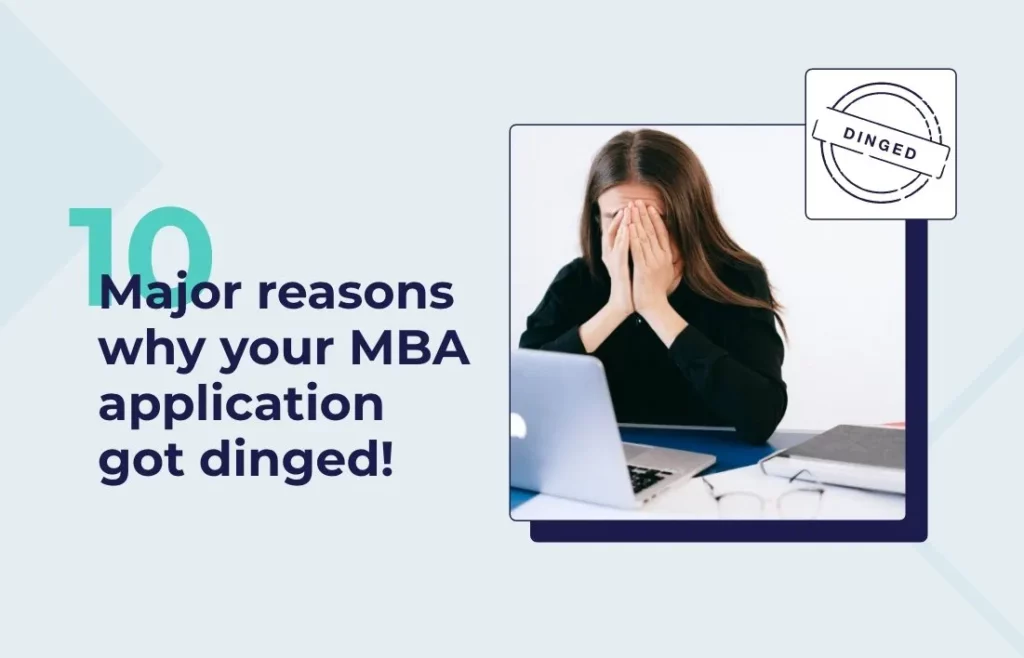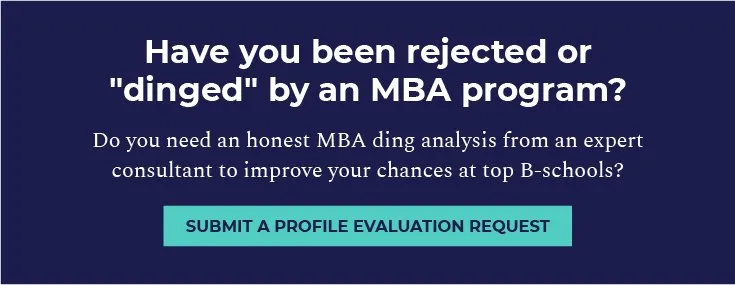10 major reasons why your MBA application got dinged!

MBA admissions to top-notch b-schools are super cutthroat, and applicants, through their essays and general applications, have to make a mark on the adcoms and create an application that sets them apart from their pool of applicants. Having perfect grades while volunteering and balancing a full extracurricular schedule may help, but it won’t guarantee you a spot at these top-notch B-schools. Applicants think that if they tick all the boxes of what is considered a strong profile, they will make it through M7/T10 schools only if that were true!
A strong application requires you to strategically pick all the pieces of your profile together. Unfortunately, there can be several reasons why your application is rejected. We compiled a list of common reasons you could be dinged and created a roadmap for you. This article will help you understand what went wrong in your dinged application and how you should strategize your next step.
Top-most reasons why your applicant can get dinged-
1) The applicant did not devote sufficient time to the application ( Applicants rushed through the application in a few days).

Applicants finish their applications without carefully considering whatever documents they must send to the school to which they are applying. Many resumes are sent to adcoms. As a result, before they can deal with individual candidates, they must first sort them. Applications containing mistakes are screened out and rejected during this phase.
2) Did not brainstorm well enough on answering the reason for why MBA?
Brainstorming helps authors generate more ideas before starting to write about a topic; more ideas mean you’ll be able to create newness in your application, which is exactly what the adcoms are looking for in an application; most applicants don’t do the brainstorming and end up with errors in their application, which get them dinged.
3) Failed to bring our collinearity between the goals.

The fact is that business schools are searching for highly motivated individuals with strong personalities who want to use their MBA to make a difference. As a result, this question is one of the most significant components of your application (Collinearity), and no matter how excellent your profile and application are, if you can’t persuade the admissions committee of the goals you’ve set and the necessity for an MBA, you’ll lose the game. Applicants who failed to demonstrate collinearity in their application were dinged.
4) Applicants did not bring out the right leadership examples.
Business schools value leadership because it demonstrates an applicant’s ability to direct a team’s efforts toward a single objective. Leadership is a crucial management job that aids in efficiently and effectively administrating an organization’s resources. Effective leaders define the organization’s goal, then motivate and guide it toward achieving it.
5) Failed to highlight the strengths properly.
Adcoms are people, and like all people, they enjoy hearing a good story, especially one that demonstrates your strength. A good tale has an issue with some emotion or tension, the main character (you) who deals with the problem and occasionally suffers from it, and a resolution. In most cases, the solution in action demonstrates your strength and indicates how capable a candidate is.
6) Generic post-MBA goals: Management consultant or Product Management.
Over 95 percent of top B-Schools select an MBA objectives essay as one of the most prevalent themes for determining your short- and long-term professional goals.
Goal-setting and expressing your professional objectives are critical components of going forward in your MBA Dream; defining your objectives and aspirations correctly will help you get closer to your professional goals. Furthermore, while writing your MBA objectives essay, it is important that you commendably split your professional aspirations into short-term and long-term goals to affect your career vision successfully. Being overly generic will almost certainly result in your application being dinged.
7) The Applicants did not highlight unique aspects of their personalities.
Again, being too generic will get you dinged; candidates who don’t exhibit their unique qualities, which don’t set them out from the crowd, will get you dinged, so keep that in mind and strive to bring out the greatest distinctive component in your application.
8) The applicant does not comprehend the difference between valuable and non-value stories.
There is a range of things that candidates do while writing stories, and there are many factors to consider, but three significant factors that might influence your application are:
Attempting to narrate your resume again
Your MBA essay examples do not correspond to your main topic.
Your stories aren’t engaging.
Try not to perform the things listed above; your application will certainly be rejected if they’re still in your story.
9) Rather than devising a strategy, they immediately began writing the essays.
When people don’t strategize and keep writing their essays, they end up expressing their CV or telling a story that isn’t compelling, which gets them dinged.
10) The USP of the applicant is unclear.
It’s difficult and simple. The most common blunder is overdoing the answer. A well-structured homework assignment is needed to answer this question. Unfortunately, most candidates fail due to being too generic or overly prepared.
Suppose you have been rejected or “dinged” by an MBA program and want to increase your chances of success the second time around. In that case, our expert counselors at MBA and Beyond can assist you in thoroughly evaluating your initial application and pointing out the loopholes (academic transcripts, test scores, CV, essays, short answer questions, and reference letters, if applicable) to find possible areas for improvement.

A typical MBA Ding Analysis culminates with a 60-90 minute conversation with an MBA Admissions Counselor, during which we examine the following topics:
So, what are you waiting for? Schedule a call with us to get a free profile evaluation and learn more about how MBA and Beyond can help you reach your goals.




Leave a Reply